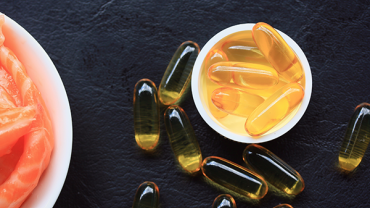
Fish oil supplementation is essential for cardiovascular health. Health care providers recommend fish oils to help improve LDL particle size and lower triglycerides, for their anti-inflammatory properties, and simply for overall health, since these fats are essential for the normal function of all of our cells.
Essential fatty acids have been shown to lower blood pressure; however, the independent effect of eicosapentaenoic acid (EPA) and docosahexaenoic acid (DHA) on blood pressure has previously been unclear. In a study published last Friday, researchers were able to demonstrate the effect of DHA on blood pressure.
In this study, 86 individuals were recruited to participate in a 12-week, randomized, double-blind trial examining the effects of supplementation with 3 grams per day of EPA, DHA, or olive oil on resting hemodynamics and muscle sympathetic nerve activity (MSNA). Both EPA and DHA supplements increased the Omega-3 Index; however, reductions in systolic and diastolic blood pressure were greater following DHA and olive oil compared to EPA. There was also an increase in heart rate in EPA supplementation compared to DHA and olive oil, and MSNA burst frequency was higher following DHA.
As a result, DHA and olive oil had a similar effect on blood pressure but DHA also increased peripheral vasoconstrictor outflow. These results demonstrate that DHA supplementation is beneficial for supporting healthy blood pressure levels, especially in those with chronic high blood pressure and sympathetic over-activation.
Previously, I shared a review that also showed benefits of DHA supplementation on cardiovascular health. In this review, a total of 51 randomized controlled trials with 3000 individuals were included. When compared to placebo, omega-3 fatty supplementation minimally reduced heart rate. However, when DHA and EPA were separately consumed, a modest reduction in heart rate was seen in studies that supplemented with DHA and not with EPA. There are limited natural agents that can effectively reduce blood pressure and heart rate. While previous research has shown a slight reduction in heart rate with essential fatty acid supplementation, there has been a growing body of research investigating the individual effects of EPA and DHA on heart rate specifically.
In addition to omega-3 fatty acids, clinicians may want to consider magnesium, taurine, potassium, and CoQ10 when working with hypertensive patients.
By Michael Jurgelewicz, DC, DACBN, DCBCN, CNS